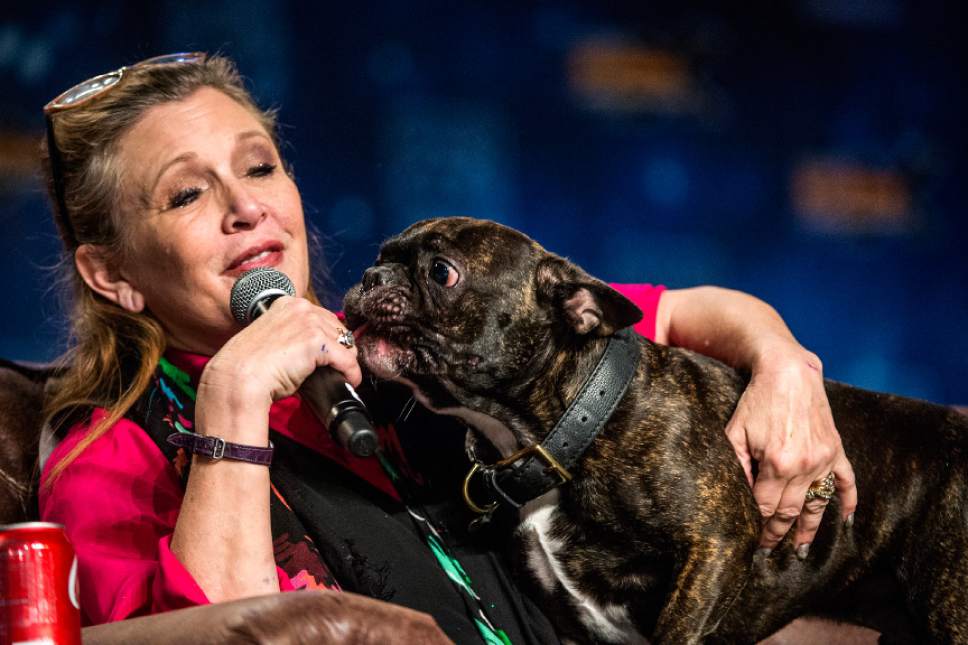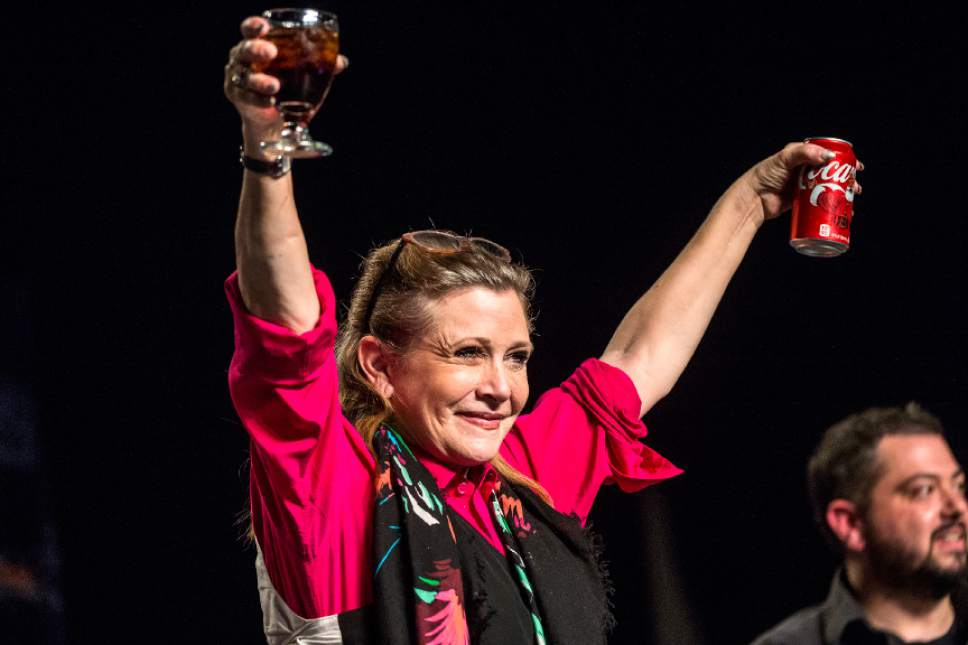This is an archived article that was published on sltrib.com in 2016, and information in the article may be outdated. It is provided only for personal research purposes and may not be reprinted.
Carrie Fisher was a witty writer, a fearless advocate for people with mental illness, and a razor-sharp commentator on the ridiculousness of celebrity.
But, as a character in "Star Wars: The Force Awakens" said, "She'll always be royalty to me."
Fisher — most familiar to billions as Princess Leia, the feisty rebel leader in the "Star Wars" movies — died Tuesday after suffering an apparent heart attack Friday on a flight from London to Los Angeles. She was 60.
Fisher was famous since she was born, as the child of movie-star parents Debbie Reynolds and Eddie Fisher. Before Carrie was 3, her father left Reynolds for an affair with Elizabeth Taylor.
Carrie Fisher was 19 when she was cast in her most famous role, as Princess Leia in George Lucas' "Star Wars" (1977) — a character she played in three more chapters: "The Empire Strikes Back" (1980), "Return of the Jedi" (1983) and "The Force Awakens" (2015). The Hollywood trade paper Variety reported Tuesday that Fisher had completed work on the still-untitled Episode VIII, to be released in 2017, but Leia's fate in Episode IX, due out in 2019, was undetermined.
Fisher also had roles in "Shampoo" (1975), "The Blues Brothers" (1980), "When Harry Met Sally..." (1989) and "Soapdish" (1991), and recurring roles on TV's "30 Rock" and Amazon's comedy series "Catastrophe" (which she was filming in London just before her death).
In her personal life, Fisher dealt with drug and alcohol addiction, was diagnosed as bipolar, had a short and tempestuous marriage to musician Paul Simon, and a relationship with agent Bryan Lourd that ended when he came out as bisexual.
All of this, and her issues with her famous parents, became fodder for her writing. Her books included the novel "Postcards From the Edge," which in 1990 she adapted into a movie starring Meryl Streep and Shirley MacLaine, and her memoir "Wishful Drinking," which she turned into a one-woman show in 2010.
The following is an interview Fisher gave to The Salt Lake Tribune on Oct. 27, 2012, ahead of an appearance to receive the Utah Film Center's Kim Peek Award for Disability in Media. The interview covered Fisher's battles with addiction, her mental health, and her relationship with the fictional character Leia.
—
You're visiting Salt Lake City to receive the Kim Peek Award for Disability in Media. Is this what you meant in "Wishful Drinking" [your memoir and one-woman show] when you said you're finally getting awards for what you do best?
I've said that if I get enough mental-illness awards, I can trade them in for sanity.
You're listed not just as an actress and writer, but also as a mental-health advocate. How does that part of your life manifest itself?
I suppose in doing things like this. I've also spoken out about some of the laws on the books about what insurance will cover for mental illness, talking about ECT [electro-convulsive therapy] and the stigma attached to that. You end up either advertently or inadvertently learning a lot about this stuff as you go along. And I don't think "advertently" is a word — I just like to use it.
When you were diagnosed as manic-depressive, what's now usually called bipolar, was there a sense of relief that at least now you had a label for what's going on?
No, I was angry. I didn't believe the person. I thought they were trying to shortcut my therapy and pigeonhole me into something. I didn't have any kind of understanding of what it was.
I was initially told I was "bipolar II," the hypomanic thing. But I was diagnosed when I was actively using [drugs], and you can't really properly diagnose someone who's still under the influence — under the cruel shade of the influence — because anybody on drugs or alcohol, if they abuse it, they're going to look like a manic-depressive whether they are or not.
I had to be sober a year to finally accept the diagnosis. When I was told I was an alcoholic or addict, I was relieved about that, because I didn't understand why I was driven to do this, and that anybody else was — that I wasn't some freak with this appetite that I couldn't seem to adequately feed. When I got that diagnosis, I thought, "Well, fine, great, that's what I am, then. I am an addict and just let me focus on that and deal with that." I went into AA — oh, you're not supposed to say AA — so I got sober with a bunch of people in rehab, and we sort of went to meetings together. Over the years, they all kind of leveled out, and I kind of headed in the opposite direction. And when I accepted I was an addict, I stopped therapy, because I'm an addict — that's really my central issue, so let's stop chattering about this other s—-.
So after a year, it was just exhausting that obviously that wasn't all that I was. So I had a friend who would sometimes talk about his shrink. It was David Geffen. His shrink would say these really raw things to him. And he's an intimidating guy. So, I thought, I want to talk to that lady. So I went to this woman, Dr. Foster, and within one session she told me I was manic-depressive. And at that point I was relieved.
How important is it to you that addiction is regarded as a disability?
"Disability" — it just sounds like someone is broken. This is an issue that I have, a condition I have — and that I sometimes struggle with, and sometimes enjoy and sometimes blessedly don't have to think about all. But most of the time, it has to be on the schedule somewhere. The fact is there isn't another word, so "disability" will have to do.
Do you still see resistance from people who want to think of addiction as a personal failing and not a disability or a condition?
I've been asked the question if I think my manic-depression is a result of my years of partying. [Laughs.] I just think there are a lot of people who aren't really educated about it. I do think this is something that I've had to struggle with and master in some way — in whatever way that I could, to the degree that you can. If you can do that and kind of still walk around, and not feel defeated and disabled — and unable and unequal — to this thing, to this sort of chink in your DNA, you can sort of feel like a successful wrestler.
When you're in the middle of it, you're not even disabled — disabled is a goal. When you get to the other side of it, it's sort of like, "All right, motherf—-er, c'mon, bring it on." But you say that after it's been brought.
I got through this stuff that was ridiculous. At a certain point, I did feel, like, badly made. And sometimes I will feel that again, but it's not a general feeling that I have.
With regards to how other people view it, that's generally not something I like to confront, but when I do, I don't feel unequal to that conversation.
I watched "Wishful Drinking" to prepare for this interview, and I realized I was screwed — because there's nothing I could ask that you haven't already answered in your books or your plays or past interviews. At what point did you decide that full disclosure, of you telling your story so other people weren't doing it for you, would be your path?
When I started to talk about it, the topic was out. I don't like other people's definition of me, or I might not like it — positive or negative. I don't recognize me frequently in those descriptions. It was a way of controlling the image, which is complicated.
You mention in the play that your own physical image is something you don't have control over, because your likeness has been sold to George Lucas. Is doing the play and speaking out a way to take it back a bit, to reclaim it?
I will never obscure Princess Leia. Never. What I am is Princess Leia's Dorian Gray, and I'm the painting in the closet. And that's a tough thing to be, because when people talk about you on the Internet or whatever, they talk about how bad the painting looks. My "before" is so much more out there than my "after," and I am absolutely dwarfed by that — defeated by that, disabled by that.
Was there a point where you realized that Princess Leia would be the first line of your obituary, no matter what else you accomplished in your life?
Yeah, sure, that was early. It's like if I were Minnie Mouse, if there was actually a human being that was Minnie Mouse. I can't not be her. So you might as well be her, then, as long as it doesn't have to be all the time.
At home, I have a figurine of Princess Leia — it came from a Burger King kid's meal, inside a larger R2-D2 figure.
They have some amazing merchandising stuff. That stuff has to be funny. What else could it be, honestly? Why go to war with it? I'm a stamp. I'm a perfume. I'm a strain of marijuana. How many people can say that?
There's this pattern with celebrities, like William Shatner or David Hasselhoff, where they try to pull away from an iconic image, but they later embrace it and take it for camp value.
You might as well. You don't really have a choice. Well, you do — your choice is to be miserable or amused. What would you pick?
Is there anything about "Star Wars" that nobody asked you about and you wondered why they didn't?
I didn't know until last night that there was a hardcore porno film of "Star Wars." I'm surprised nobody told me that sooner. And I didn't know until today that Kim Kardashian and Kanye West dressed up as Princess Leia and a stormtrooper.
It comes up almost every day. You'll hear some reference to those movies. Somebody will say something pertaining to "the dark side," or quoting Yoda, or whatever it will be. It's just become part of the culture, part of the vernacular.
I don't even have to specifically pay attention to it. It's like getting Google alerts. Literally, once a day, my grid will light up with someone saying something that relates to those movies, whether I read it or hear it or see it on television.
Your telling of your own story reminds me of the Nora Ephron quote, that "everything is copy," that all life can be material.
It is if you're a certain type of person. It is if you're an archaeologist and you're stuck in your own pit.
Twitter: @moviecricket







